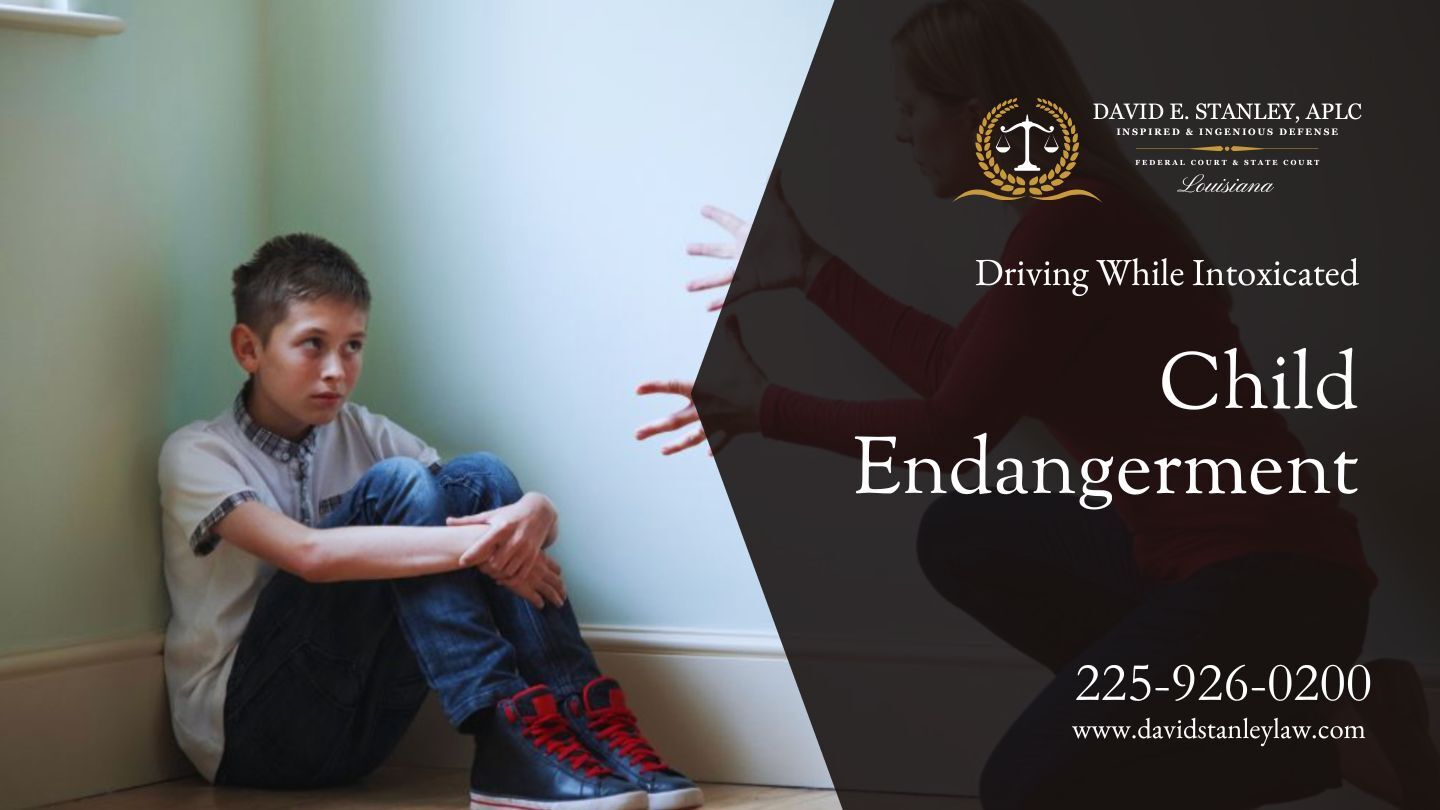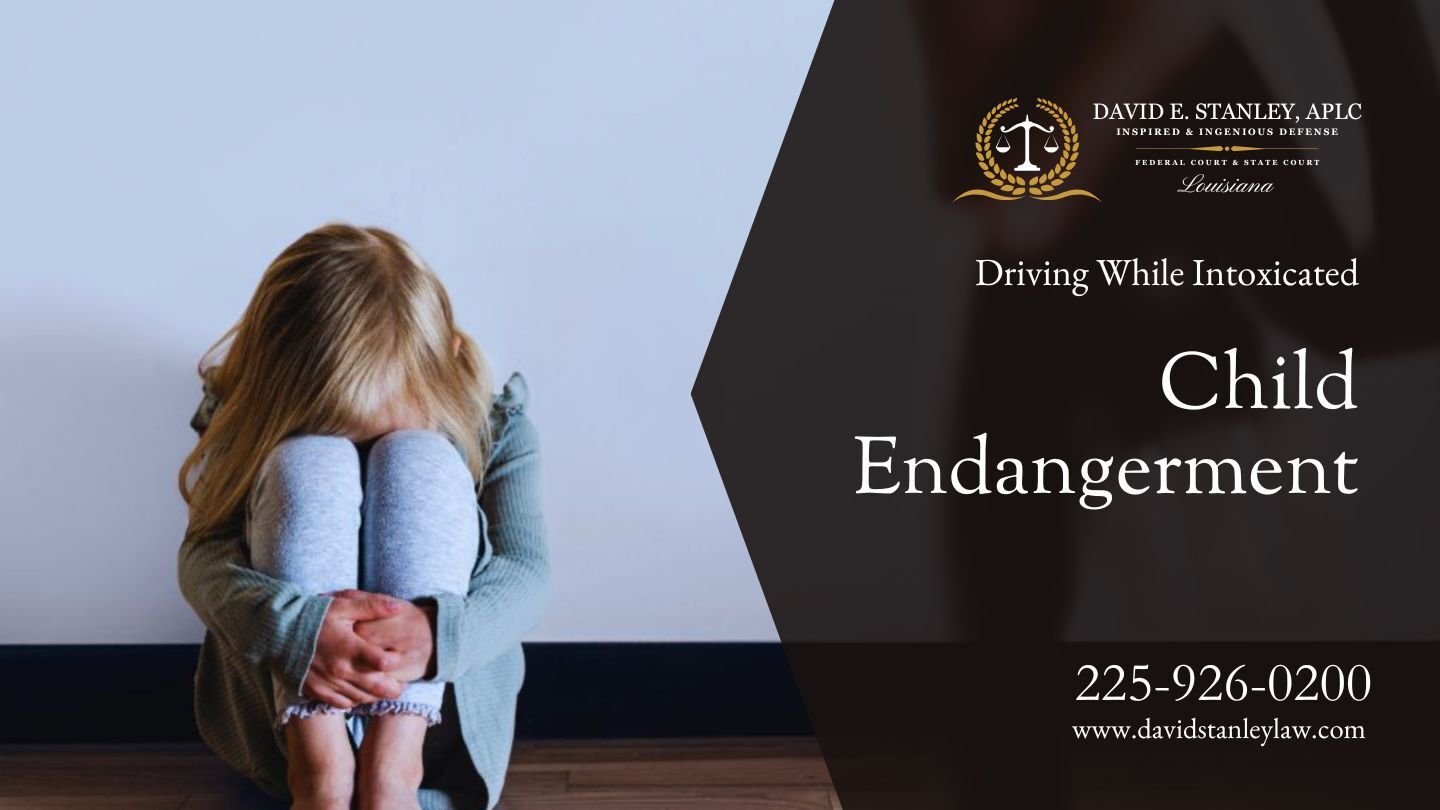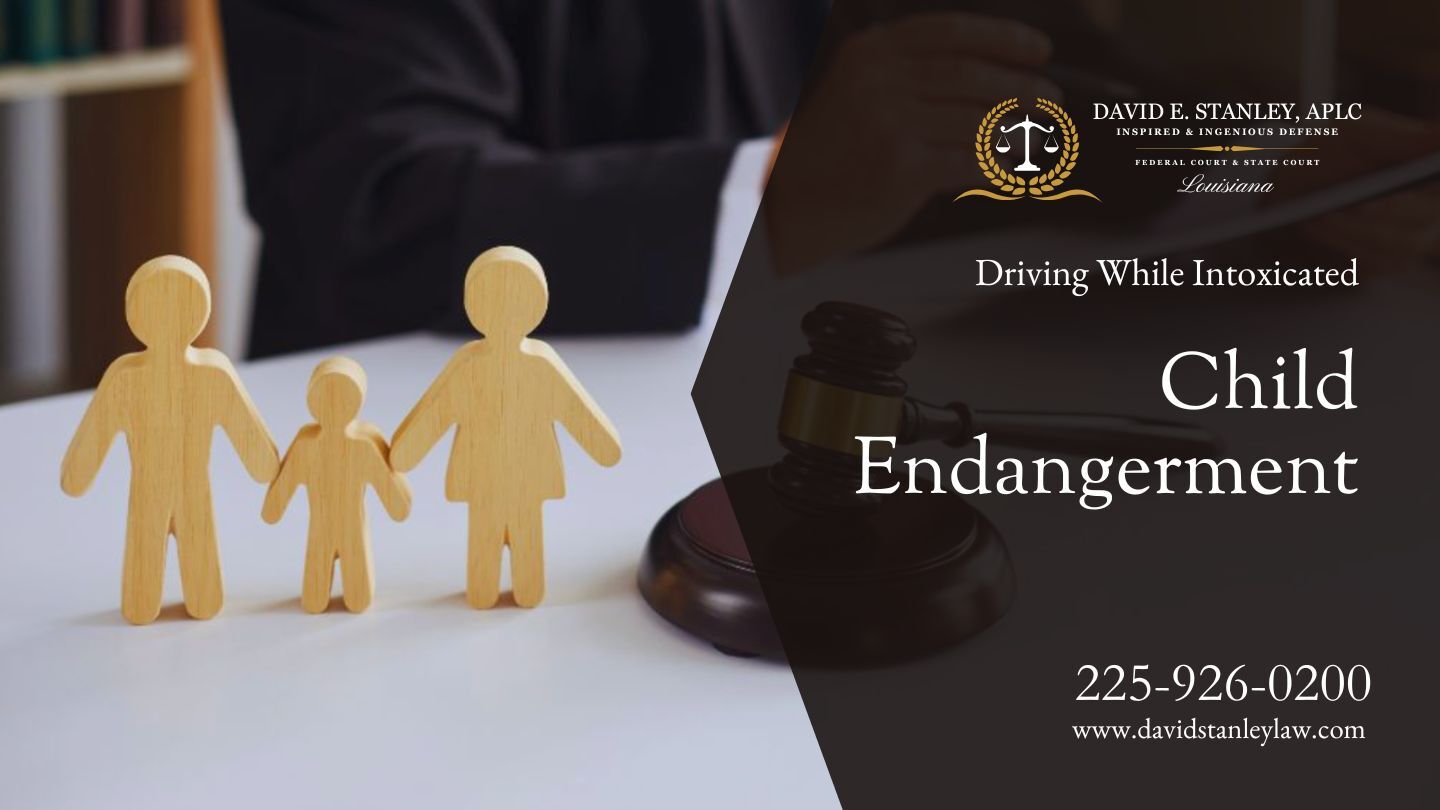Child Endangerment with DWI - David E. Stanley, APLC
Table of Contents
ToggleAny behavior or carelessness that puts a child in danger of suffering bodily, psychological, or emotional harm is considered child endangerment in Louisiana. It may involve desertion, substance misuse by a parent or guardian, or exposure to domestic violence. Child endangerment may also include neglecting to provide appropriate care, supervision, or protection from hazardous circumstances. Louisiana law treats these offenses seriously due to their potential long-term effects on a child’s well-being. Depending on the seriousness of the situation, those convicted of child endangerment may be subject to harsh legal repercussions, such as fines, custody loss, or incarceration.

David E. Stanley, APLC, defends individuals facing child endangerment charges in Louisiana. These cases often arise in the context of domestic abuse battery and carry serious legal consequences, including fines, loss of parental rights, or imprisonment. Our firm carefully examines each case, challenges evidence, and builds a strong defense to achieve the most favorable outcome. If you or a loved one is facing these charges, seeking experienced legal representation is essential.
What You Need to Know About Child Endangerment
What Is Child Endangerment?
Child endangerment refers to an act—or failure to act—that puts a child’s safety, health, or well-being at risk. It can include physical harm, neglect, emotional abuse, or exposing a child to dangerous situations, such as drug use, domestic violence, or unsafe living conditions. State laws pertaining to child endangerment differ, but depending on the seriousness of the offense, punishments may include fines, custody loss, or even criminal prosecution. Since the main objective is to shield the child from both immediate and long-term harm, authorities treat these instances very seriously.
Understanding Louisiana’s Child Endangerment Law
If a child, 12 years of age or below, is in a car when a DWI arrest is made, there are harsh consequences under Louisiana’s Child Endangerment Law. However, this offense carries heavier penalties, including mandatory jail time, and can have severe consequences for your family.
-
DWI and Child Endangerment
Driving while intoxicated (DWI) can result in child endangerment charges, as it puts young passengers at risk. Alcohol and substance use often contribute to these situations. Although parents may not intend harm, impaired judgment due to intoxication can create dangerous conditions for children.
A DWI attorney can help navigate the legal process. If facing DWI and child endangerment charges, understanding the legal consequences is essential. Below is a breakdown of penalties based on offense levels.

Penalties for Child Endangerment
In Louisiana, driving while intoxicated with a child 12 years of age or younger in the vehicle can lead to a child endangerment charge. This applies even if no injury occurs, as the law prioritizes preventing the risk of harm rather than requiring actual harm to have occurred. The penalties escalate based on the number of offenses and the circumstances of the case, making repeat violations increasingly severe.
First Offense
A first-time child endangerment conviction carries the following penalties:
- A fine ranging from $300 to $1,000
- A jail sentence of 10 days to six months
- Enrollment in a court-approved substance abuse program
- Completion of a court-approved driver-impairment program
- Possible installation of an ignition interlock device
Second Offense
A second conviction results in more severe consequences, including:
- A fine between $750 and $1,000
- A jail sentence of 30 days to six months
- Completion of court-approved substance abuse and driver-impairment programs.
Third Offense
A third conviction results in stricter penalties, including:
- A $2,000 fine
- One to five years in prison
- A substance abuse evaluation conducted by the Louisiana Department of Health and Hospitals
- A mandatory ignition interlock device
- A restricted driver’s license
- Ongoing participation in substance abuse and driver impairment programs
Additionally, the ignition interlock device remains in place until all probation requirements, such as substance abuse treatment or home incarceration, are completed.
Fourth Offense
A fourth conviction results in the most severe penalties:
- A $5,000 fine
- A prison sentence of 10 to 30 years
- Potential seizure or sale of the vehicle
- A mandatory ignition interlock device
- A restricted driver’s license
By the fourth offense, options for reducing or dismissing charges are extremely limited. Seeking legal counsel immediately is crucial if you are facing such allegations. The urgency of the situation cannot be overstated.
Frequently Asked Questions
What Is the Difference Between Child Abuse and Child Endangerment?
Child abuse involves the intentional infliction of physical, emotional, or sexual harm, while child endangerment occurs when a caregiver’s actions or negligence put a child at risk of harm, even if no direct injury occurs. This distinction is crucial because child endangerment focuses on creating dangerous situations rather than direct harm.
Is Child Endangerment a Felony in Louisiana?
In Louisiana, child endangerment may be classified as a misdemeanor or a felony, depending on the severity of the situation. Cases involving serious harm, neglect, or imminent danger to a child can lead to felony charges, resulting in fines and imprisonment. Courts evaluate intent, risk, and impact on the child when determining penalties.
Can Disciplining My Child Lead to a Child Endangerment Charge?
Yes, if discipline becomes excessive or harmful, it may lead to a child endangerment charge. Louisiana law permits reasonable discipline, but actions that cause injury or put a child at serious risk can result in charges. Courts evaluate the severity of the discipline, whether it was reasonable under the circumstances and the impact on the child when making a determination.
Child Endangerment Defense Lawyer in Baton Rouge, LA

Facing child endangerment charges in Louisiana can affect your freedom, reputation, and parental rights. A strong defense is essential, whether the charges stem from a misunderstanding, false allegations, or an isolated incident. David E. Stanley, a defense attorney in Baton Rouge, LA, has extensive experience handling these cases. He navigates Louisiana law, challenges evidence, and protects your rights. Take action today—call David E. Stanley for a confidential consultation and start building your defense.
David E. Stanley, APLC
1055 Laurel Street, Suite 2 Baton Rouge, LA 70802
225-926-0200


